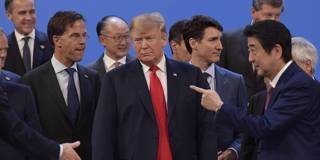As Japan prepares to host its first G20 leaders’ summit later this month, little remains of the open and cooperative spirit that marked the first such gathering in 2008. But although the United States will most likely continue its protectionist drift, other G20 countries should use the occasion to make a clear case for free trade.
MADRID – On June 28-29, Japan will host its first G20 summit. The initial gathering of G20 leaders, back in November 2008, took place amid the turmoil that wracked global financial markets following the collapse of Lehman Brothers. It produced a clear statement: “We underscore the critical importance of rejecting protectionism and not turning inward in times of financial uncertainty.” In other words, the leaders of the world’s largest economies agreed not to repeat the policy mistakes that aggravated the Great Depression in the 1930s.

MADRID – On June 28-29, Japan will host its first G20 summit. The initial gathering of G20 leaders, back in November 2008, took place amid the turmoil that wracked global financial markets following the collapse of Lehman Brothers. It produced a clear statement: “We underscore the critical importance of rejecting protectionism and not turning inward in times of financial uncertainty.” In other words, the leaders of the world’s largest economies agreed not to repeat the policy mistakes that aggravated the Great Depression in the 1930s.